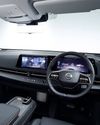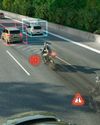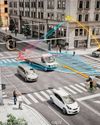At the 11th Schaeffler Symposium in Baden-Baden in April last year, global automotive and industrial supplier, Schaeffler introduced an urban vehicle concept called the “Schaeffler Mover” – a compact wheel module that combines the drive and chassis components of this vehicle that is designed for fully autonomous operation. The concept was presented as the company’s answer to addressing the mobility challenges in rapidly growing metropolitan areas.

While robotised vehicles are still some time away from being adopted as mass mobility solutions, the company continues to invest and innovate in more immediate challenges. Electrified mobility is bound to become mainstream in the future, but internal combustion engines still have enough juices left to be extracted – both in the conventional manner as well as through hybridisation. At the Symposium on International Automotive Technology (SIAT) 2019, the company showcased a range of powertrain solutions that improve performance, efficiency, reliability and safety.
POWERTRAIN SCENARIO
Schaeffler is of the view that globally, by 2030, 30 % of all new vehicles produced that year will be full Battery Electric Vehicles (BEVs), while another 30 % that particular year will be pure internal combustion engines. The remaining 40 % will be propelled by hybrid powertrains. In effect, 70 % of all passenger vehicles will be using at least one electric motor as a source of propulsion. The company calls it the 70-70 view, depending on where you start from, Dharmesh Arora, CEO, Schaeffler India had told Auto Tech Review in an interaction last year.
The company’s powertrain architecture is built around a six-stage matrix that ranges from P0 to P5, from conventional ICEs to BEVs that will have solutions ranging from start-stop, to micro 12 V, to 48 V, full hybrids (FHEV), plug-in hybrids (PHEV), fuel cell (FCEV) to battery electric vehicles (BEVs). We put that into the Indian context and asked Dr Roland Welter, President, BU Clutch Systems, Schaeffler AG for his thoughts. 48 V solutions as an entry point makes sense for the Indian market, he said, and believes from an OEM perspective, P2 and P3 could be attractive propositions as well.
Bu hikaye Auto Tech Review dergisinin March 2019 sayısından alınmıştır.
Start your 7-day Magzter GOLD free trial to access thousands of curated premium stories, and 9,000+ magazines and newspapers.
Already a subscriber ? Giriş Yap
Bu hikaye Auto Tech Review dergisinin March 2019 sayısından alınmıştır.
Start your 7-day Magzter GOLD free trial to access thousands of curated premium stories, and 9,000+ magazines and newspapers.
Already a subscriber? Giriş Yap

Sound Generation For Enhanced Road Safety
With an ever-increasing number of fully electric and hybrid vehicles entering the market, we are witnessing a change in the acoustic experience in and around the car. The silent nature of the electric powertrain means that other road users miss the familiar acoustic cues that warn them of an approaching vehicle. To remedy this situation, Harman is working on various noise management solutions.

OBJECTIVE ASSESSMENT OF THE SAFETY CONTRIBUTION OF TODAY'S AUTOMOTIVE HEADLAMPS
Good lighting makes a major contribution to road safety. In 2011, the International Commission on Illumination (CIE) presented an evaluation system for headlamps that can objectively assess the quality of illumination and glare limitation. New light sources like LEDs and lighting functions (glare-free high beam, partial high beam) have been available for several years, so that an extension of the proven CIE method is necessary, which takes into account, among other things, changed switch-on and service lives of new lighting functions and represents a generally understandable evaluation system. An evaluation system presented in the following by the Technische Uni versität Darmstadt, which was developed by an encompassing expert commission, is intended to provide representative data and enable an objective evaluation of headlamp performance.

RAPIDO RE-INNOVATES TO CATER TO POST COVID-19 LAST MILE CONNECTIVITY
The rapid pace of urbanisation in the country has witnessed cities expanding and subsuming surrounding villages and smaller towns, evolving into Tier II and III cities.

FUNCTIONAL SAFETY STANDARDS TOP PRIORITY FOR FUTURE AUTOMOTIVE DEPLOYMENT
Increasing levels of electronic content in vehicles result in a large amount of software that is required to run the scenes behind the mechanical aspects of a vehicle. Electronic systems in automobiles are part of every section, from the powertrain to comfort and convenience systems as well as all types of safety equipment. This makes electronics and the software running these systems a critical part of the equation for future mobility solutions. In addition, putting standards in place to measure methods of developing, testing and functioning of such electronic systems also becomes highly relevant.

“BYD'S EV STRATEGY TO ENCOMPASS MOST FORMS OF TRANSPORTATION NEEDS IN INDIA”
The country’s electric vehicle (EV) ecosystem is grappling with a plethora of challenges even as it is striving to wriggle itself out of the ‘nascent stage’ tag. In an exclusive chat with Auto Tech Review, Zhang Jie Ketsu, Executive Director, BYD India shares his perspective on the current EV scenario and how the company intends to progress faster in the Indian automotive industry

SAFETY IN ELECTRIC AND AUTONOMOUS CARS – SIMULATION OF COMPLEX CRASH SCENARIOS
Electric and autonomous vehicles allow for novel seating arrangements and packaging strategies, presenting new safety challenges. Physical crash testing must be supplemented with virtual simulation to ensure vehicle safety on shorter development cycles. With its Simcenter Madymo MBS software, Siemens provides improved runtimes and the Active Human model, enabling accurate and rapid occupant safety analysis in complex crash scenarios.

KIA SONET – A MIGHTY OFFERING IN THE COMPACT SUV SEGMENT
It wouldn't be wrong to say that Kia Motors India has taken the Indian market by storm in less than 12 months of its presence in the market.

NISSAN'S NEW DIRECTION: ARIYA ALL-ELECTRIC
Marking a key milestone in Nissan’s transformation strategy, Ariya ticks a lot of boxes highlighting the strengths of the global automotive giant.

BETTER SAFETY WITH EMERGENCY BRAKE ASSIST FOR MOTORCYCLES
Rear-end collisions with a slower vehicle suddenly cutting into the lane and intersection accidents with cross-traffic are among the most frequent motorcycle accident types. Continental is now developing an emergency brake assist, which detects an imminent collision with a vehicle ahead or with an obstacle, warns the rider and supports him during braking

ADAS WILL SERVE AS CATALYST FOR IMPROVED VEHICLE SAFETY
The automotive industry across the globe is increasingly focussing on safety.